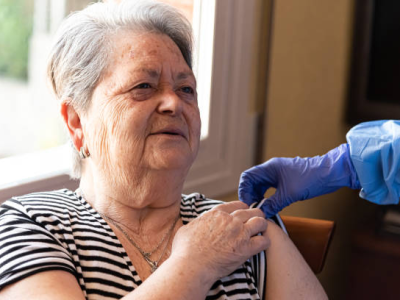Study: Swapping bedaquiline for injectables improves MDR-TB outcomes
The substitution of bedaquiline for second-line injectable antibiotics (SLIs) in a small group of patients with multidrug-resistant tuberculosis (MDR-TB) resulted in improved outcomes, South African researchers report in Clinical Infectious Diseases.
In South Africa, the oral antibiotic bedaquiline is now widely being used in MDR-TB regimens for patients who are unable to tolerate SLIs, which have been associated with significant adverse events, such as hearing loss. To determine the effectiveness of this strategy, the retrospective cohort study looked at patients with laboratory-confirmed MDR-TB who received bedaquiline as a substitute for SLIs from October 2014 through October 2016. The study also included a group of MDR-TB patients who did not receive bedaquiline.
The primary outcome measure was the proportion of patients with unfavorable outcomes at 12 months, defined as a composite of death, loss to follow-up, and failure to achieve sustained culture conversion. The patients were matched 1:1 for clinic location and time of treatment.
The study included 330 patients overall (162 patients who received bedaquiline and 168 controls), 70.6% of whom were also HIV-infected. Unfavorable outcomes occurred in 23.9% of patients (35/146) in the bedaquiline group, compared with 36.2% of patients (51/141) in the control group (relative risk [RR], 0.66). The reduction in unfavorable outcomes with bedaquiline use was mainly influenced by differences in sustained culture conversion rates: Only 5.9% of patients (7) who switched to bedaquiline failed to achieve sustained culture conversion at 12 months, compared with 17.4% of patients (19) in the control group. In addition, the number of patients with culture reversion was significantly lower in the bedaquiline group (1 patient [0.8%] vs 12 patients [10.3%] in the control group). Mortality in the two groups was similar at 12 months (11 deaths in each group).
The authors of the study say the findings provide additional evidence to support the routine inclusion of bedaquiline in MDR-TB regimens.
Aug 24 Clin Infect Dis abstract
Australian GP stewardship program reduces prescribing, saves money
A study of general practitioners (GPs) in Australia indicates that a multifaceted package of interventions to reduce antibiotic prescribing for acute respiratory infections (ARIs) was effective, well-received, and feasible.
The summary report of the General Practitioner Antimicrobial Stewardship Programmes Study (GAPS) describes a cluster randomized trial that compared two parallel groups of GPs in 27 clinics in Queensland before and after implementation of an evidence-based package of interventions. The interventions included a poster on antibiotic prescribing policy in GP waiting rooms or examination rooms, a patient information leaflet, an online communication training package, delayed antibiotic prescribing, patient decision aids, and near-patient testing with C-reactive protein.
The primary objective of the study was to assess the effectiveness of the package in reducing antibiotic prescribing for ARIs. The researchers also looked at the costs and cost-effectiveness of the intervention package and assessed feasibility and uptake.
While the results showed that there were measurable declines in antibiotic prescribing in both the intervention and control groups during the intervention phase compared with the baseline phase, a secondary analysis found a statistically significant reduction in prescribing rates of 7% for the intervention group compared with the control group (RR, 0.93), resulting in a net decrease of 3.8 antibiotic prescriptions per GP per month. Including the economic benefit of avoiding adverse antibiotic reactions (rashes and diarrhea) and Clostridium difficile, the researchers estimated that the cost savings from the reduced prescribing was just over $57,000. If rolled out to 250 practices over 3 years, the researchers calculated, these savings could offset the cost of implementing the intervention package by over $200,000.
Phone interviews with GPs from the intervention practices found that the intervention package was well-received, was considered adaptable to individual practices, and provided GPs with the opportunity to reflect on their management of patients with suspected ARIs.
The authors say the findings should help inform policy for future national implementation.
Aug 27 GAPS final summary report













